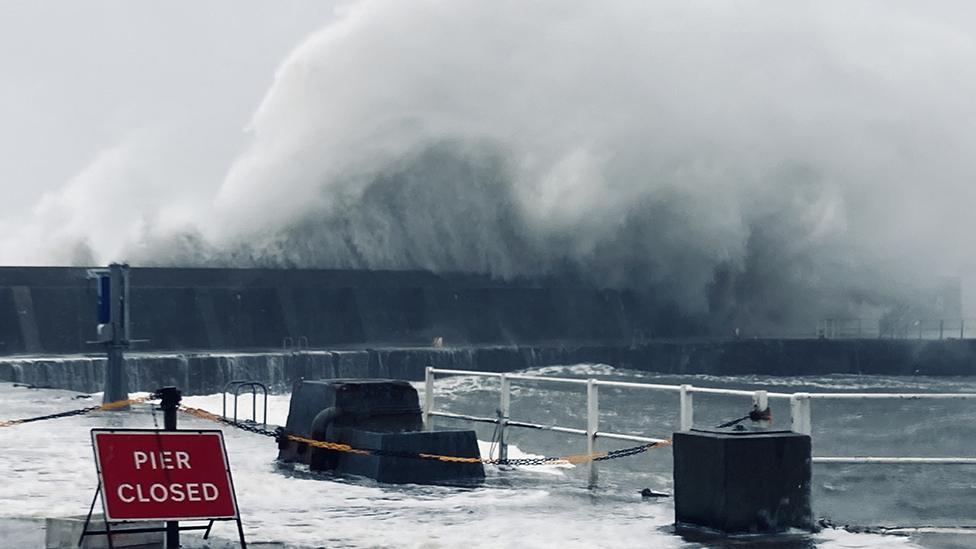Lincolnshire flooding: Storm Babet affects more than 150 homes
- Published
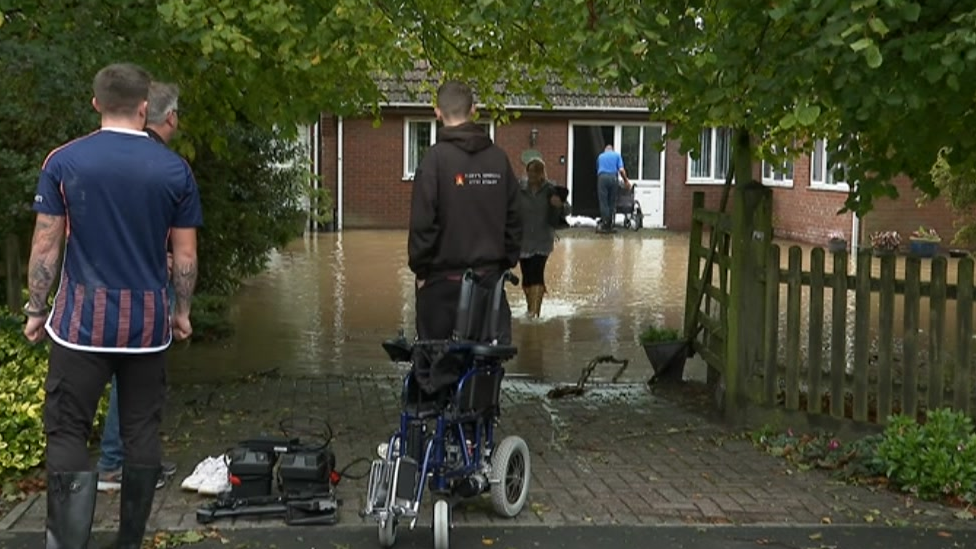
Fire chief Mark Baxter said 30 to 40 people in Wainfleet had been evacuated
Residents in Lincolnshire have told of their heartache after homes were flooded by Storm Babet.
The Environment Agency (EA) said more than a month's rain fell in the county in 24 hours, while 23 flood warnings remain in place.
Lincolnshire's chief fire officer Mark Baxter said more than 150 properties across the county had been flooded.
One resident of Wainfleet, where dozens of people were told to evacuate their homes, said: "Everyone is worried."
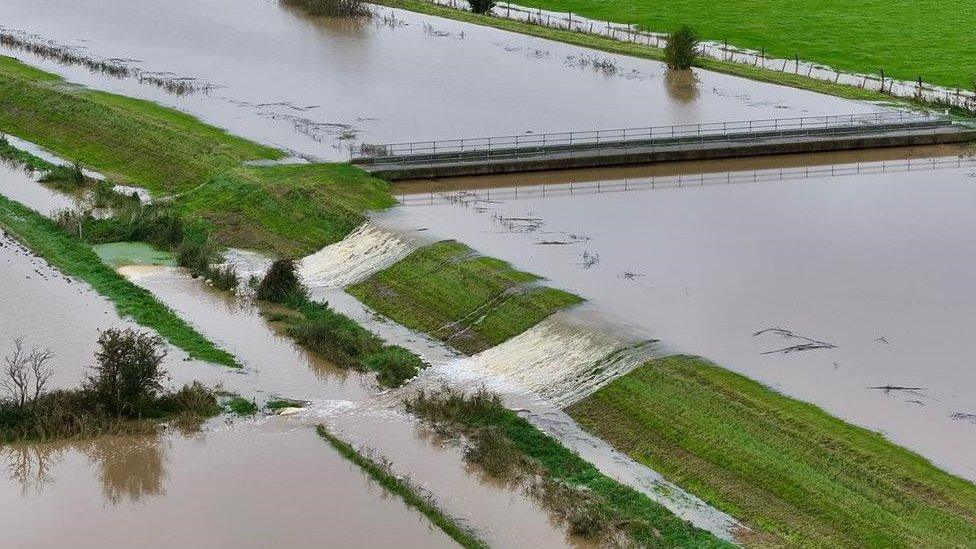
Overtopping at Wainfleet
Follow live updates: Storm Babet
According to the EA, "multiple" homes in Horncastle have also been affected.
Mark Baxter, chief fire officer of Lincolnshire Fire and Rescue Service (LFRS), said "30 to 40 people" in Wainfleet had been evacuated, with about 10 properties affected. A rest centre had been established in the town, he added.
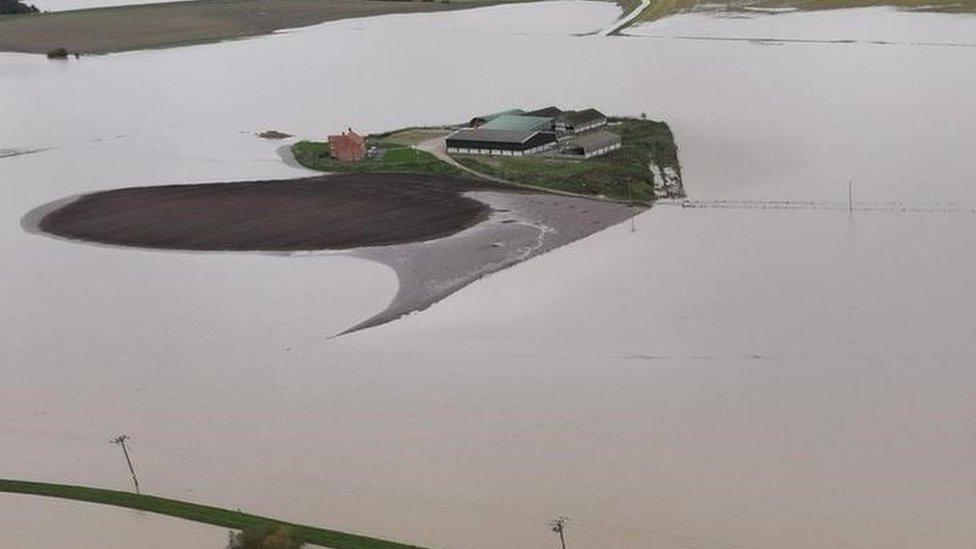
A farm was left marooned in Short Ferry near Stainfield
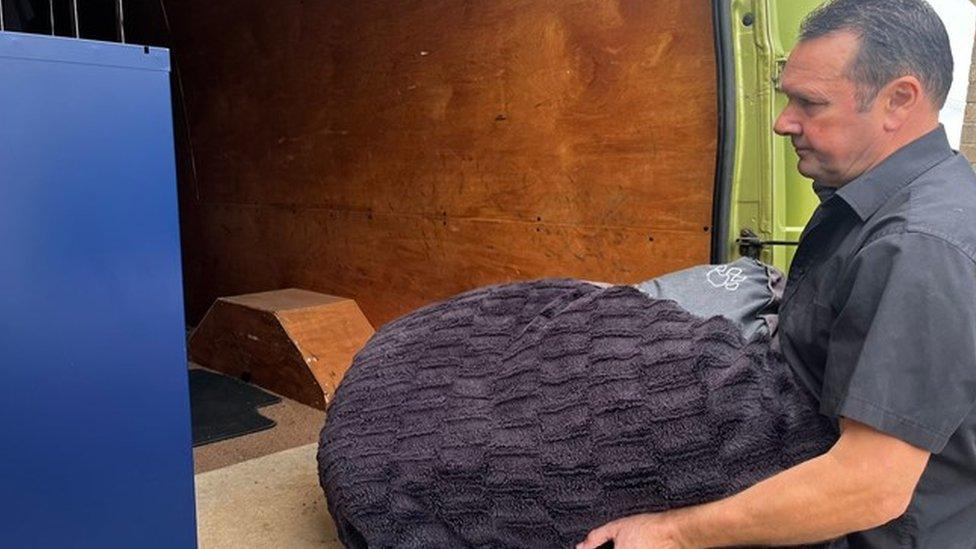
Colin Blackburn packs his belongings into a van
In total, he said more than 150 properties across Lincolnshire had flooded.
Christine Webb, one of those evacuated in Wainfleet, said: "It has flooded up the drive. It's not far off the front door. It's worrying but everyone is in the same situation. "
Also in Wainfleet, the BBC spoke to Colin Blackburn as he was packing bags after being advised to evacuate.
He said: "We're packing everything away in boxes, loading the van and getting everything taken away."
LFRS said it had taken 500 flood-related calls in the past 24 hours.
Elsewhere, BBC Radio Lincolnshire reported the River Bain had burst its banks at Tattershall. Properties and nearby RAF Coningsby were so far unaffected.
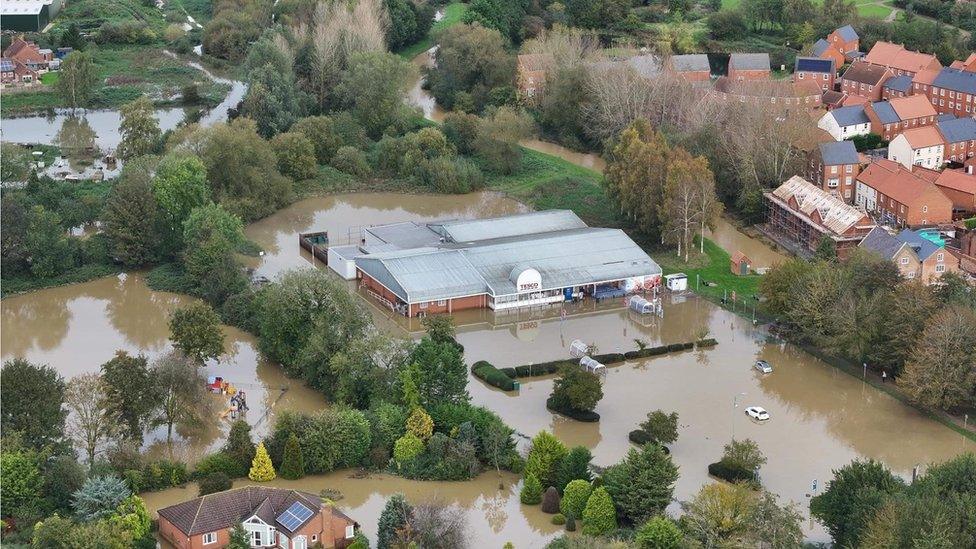
A Tesco store in Horncastle was swamped by flood water
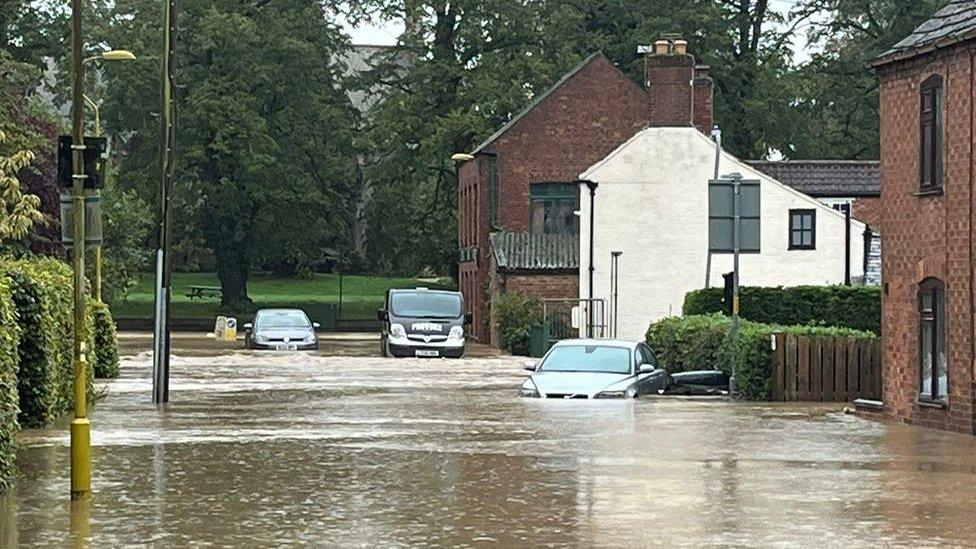
Residential areas of Horncastle have also seen significant flooding
Across the UK, three people have died in the storm. The BBC is not aware of any flood-related casualties in Lincolnshire.
Richard Fenwick, head of highways at Lincolnshire County Council, said 13 roads remained closed.
Mr Fenwick said the focus would turn to what happened as the flood water receded after what he described as "an interesting night".
He added: "As all that water goes away from the roads, and unfortunately, where it has got into properties, it will naturally get into water courses and then there is a risk that this water could cause overtopping. That's the phase we're moving into."
The peak, from the highways team's perspective, came on Friday afternoon and evening, he said.
"Since the rain has died down a bit in the early hours we have caught up with reports that have come in."
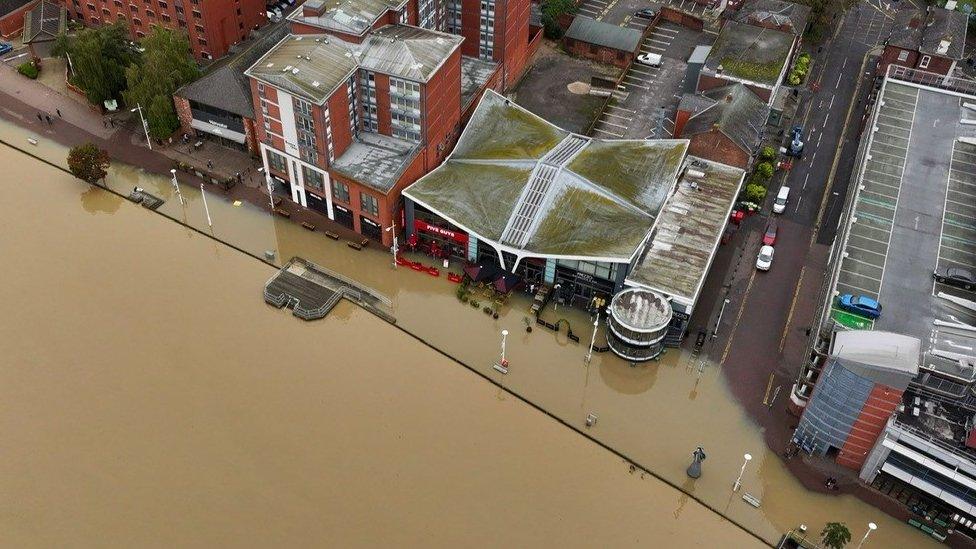
A drone image showing part of Lincoln city centre flooded
Mr Fenwick said his team had responded to 264 flood-related incidents on Lincolnshire's roads.
"We have crews all over the county trying to keep up with all the issues that there are.
"We expect there will be flood water across Lincolnshire for the remainder of the day," he said. "People should be careful."
Helen Tooley, divisional commander at LFRS, said crews were checking on residents whose homes had been flooded but added: "It's really difficult because we have had so much rain. We need somewhere to pump water to so unfortunately we are really limited to what we can do."
Ben Thornely, the Environment Agency's area flood risk manager, said "between a month and two months of rain" fell in 24 hours.
Teams were working with residents to deal with the impact of the "devastating" downpour, he said.
He urged people to ensure they had signed up for flood alerts by entering details on the agency's website.
On Friday, the council said flooding had been recorded across swathes of the county, with Woodhall Spa, Horncastle ands Kirkby on Bain particularly badly affected. The BBC is aware areas around Market Rasen were also badly hit.
BBC Look North weather presenter Keeley Donovan said by midday on Friday 63mm (2.5in) of rain had fallen in Waddington - more than double the average monthly amount.
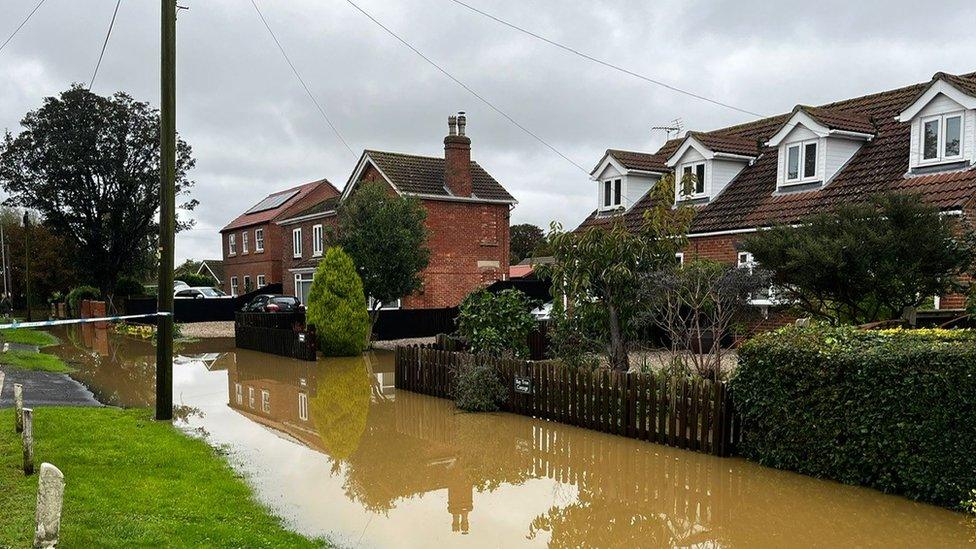
Flooding in Spilsby Road, Wainfleet

Analysis
By Paul Murphy, BBC Look North environment correspondent
These are some of the worst floods in living memory in Lincolnshire.
They have been especially damaging because exceptionally heavy rainfall has been so widespread across the county. The network of drains, pumps and flood gates used to regulate water simply cannot cope with this volume of water.
The fire service is working around the clock to pump out flooded properties. The challenge they face is where to pump the flood water when all the streams, rivers and lakes are full to capacity or overflowing.
Mild temperatures mean a warmer atmosphere capable of holding more water vapour. Like many other parts of the UK, Lincolnshire has suffered more than a month's worth of rain over the last 24 hours.
Extensive road flooding means a largely rural county of high car dependency is facing paralysis. Some communities are even cut off and surrounded by water. The advice is only make essential trips. Numerous vehicles have been abandoned in the flood water.
Tens of thousands of acres of some of the best farmland in the country are now under water. Brown streams run down country lanes as valuable soils are being washed away. Newly sown crops are carried with them - the wheat that farmers had hoped to harvest next year.
Some communities have only just recovered from the last series of devastating floods. In 2019 dozens of properties in Wainfleet were inundated after the banks of the Steeping River collapsed. Parts of Wainfleet are once again under water and homes are again being evacuated. The river bank is being overtopped - this is bad enough - but should the bank breach again the swollen river will cause extensive misery.
Even places where special flood protection has been put in place have suffered. In recent years more than £8m was invested in flood storage ponds above Horncastle. These may have played a role in reducing the impact of Storm Babet but many properties in the town were still under water today.
This is a county where huge efforts have been made to adapt to the new realities of flood risk. But rain events like those of the last 48 hours are becoming more potent and more frequent as our climate changes.

Follow BBC East Yorkshire and Lincolnshire on Facebook, external, Twitter, external, and Instagram, external. Send your story ideas to yorkslincs.news@bbc.co.uk, external.
Related topics
- Published20 October 2023

- Published21 October 2023

- Published20 October 2023
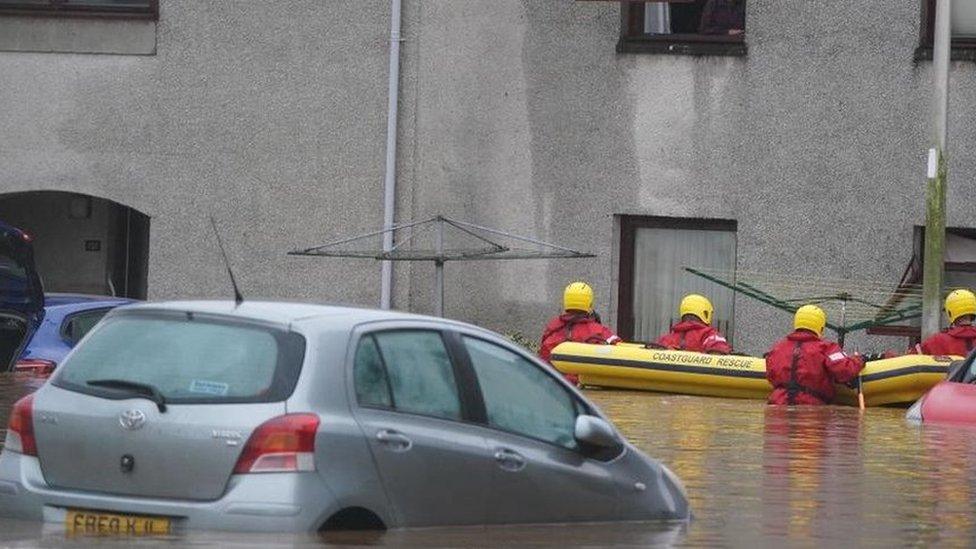
- Published19 October 2023
